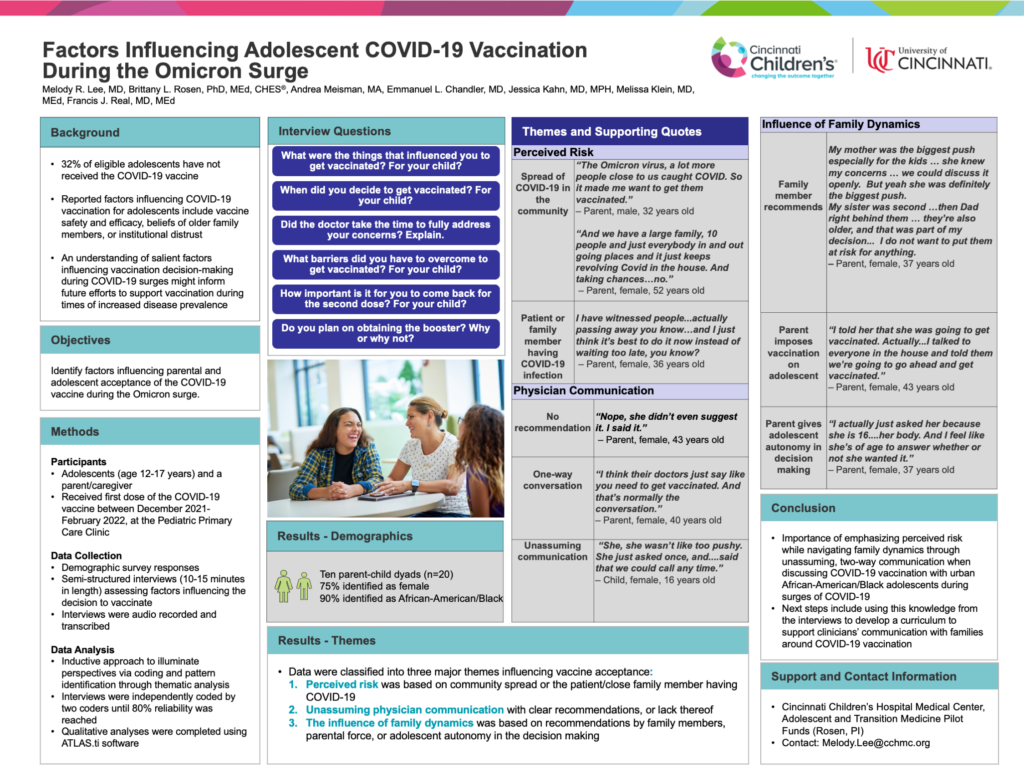Factors Influencing Adolescent COVID-19 Vaccination During the Omicron Surge
Melody R. Lee, MD, Brittany L. Rosen, PhD, MEd, CHES, Andrea Meisman, MA, Emmanuel L. Chandler, MD, Jessica Kahn, MD, MPH, Melissa Klein, MD, MEd, Francis J. Real, MD, MEd

Our study demonstrated the importance of emphasizing perceived risk while navigating family dynamics through unassuming, two-way communication when discussing COVID-19 vaccination with urban African-American/Black adolescents during a surge. These findings can inform clinicians to tailor communication to support vaccine uptake in these communities.
Melody Lee, MD
Abstract
Background: Despite the increase in COVID-19 cases due to the Omicron variant in December 2021, many adolescents remained unvaccinated despite vaccine availability. Many factors have been reported to influence decisions around COVID-19 vaccination for adolescents. Gaining a better understanding of the most salient factors influencing vaccination decision-making during a surge in COVID-19 cases is critical to inform future efforts to support vaccination during times of increased disease prevalence.
Objective: We sought to identify factors influencing parental and adolescent decision-making leading to acceptance of the COVID-19 vaccine during the Omicron surge.
Methods: Eligible adolescents (age 12-17 years) who received their first dose of the COVID-19 vaccine at an urban academic pediatric clinic in Southwest Ohio were invited to participate with their parent in an interview. Ten parent-adolescent dyads (n=20) agreed to participate. Data were derived from in-depth, semi-structured interviews assessing factors influencing the decision to vaccinate. Interviews were audio recorded, transcribed, and qualitative analyses were completed using ATLAS.ti software. We used a constructivist general inductive approach to illuminate perspectives via coding and pattern identification through thematic analysis. Participants provided demographic data.
Results: Of the population interviewed, 75% identified as female, and 90% identified as African American/Black. The mean ages were 38.9 and 14 years for the participating parents and adolescents, respectively. We classified interview data into three major themes: perceived risk, the influence of family dynamics, and physician communication (See Table 1).
Conclusions: Our study demonstrated the importance of emphasizing perceived risk while navigating family dynamics through unassuming, two-way communication to support vaccine uptake among urban African American/Black adolescents during surges of COVID-19 infection.
Table 1. Principle Themes Influencing COVID-19 Vaccine Decisions in Adolescents
| Perceived Risk | |
| Spread of COVID-19 in the community | “The Omicron virus, a lot more people close to us caught COVID. So it made me want to get them (the adolescent) vaccinated.” – Parent, male, 32 years old “And we have a large family, 10 people and just everybody in and out going places and it just keeps revolving Covid in the house. You know what I’m saying? And taking chances…no.” – Parent, female, 52 years old |
| Patient or family member having COVID-19 infection | “Like I said my dad was already sick. He had a very hard time because he had got Covid a month before I did, and he was hospitalized on a ventilator. He was lucky to make it through. So, it was like a no brainer. After that it was a no brainer. Like get vaccinated, stay safe.” – Parent, female, 40 years old “I have witnessed people, you know, actually passing away you know…and I know…I just think it’s best to do it now instead of waiting too late, you know?” – Parent, female, 36 years old |
| Influence of Family Dynamics | |
| Recommendation by family members | “My mother was the biggest push especially for the kids and again, she knew my concerns. So she knew it was more, we could discuss it openly. But yeah she was definitely the biggest push. My sister was rounding up in second right behind her, and then Dad right behind them. And they’re also older, so and that was part of my decision as well because they are older. I do not want to put them at risk for anything, so that was part of my decision.” – Parent, female, 37 years old |
| Parent imposes vaccination on adolescent | “I told her (the adolescent) that she was going to get vaccinated. Actually, I said and I talked to everyone in the house and told them we’re going to go ahead and get vaccinated.” – Parent, female, 43 years old |
| Parent gives adolescent autonomy in decision making around vaccination | “I actually just asked her (the adolescent) because she is 16, her body. And I feel like she’s of age to answer whether or not she wanted it.” – Parent, female, 37 years old |
| Physician Communication | |
| A lack of recommendations | “Nope, she didn’t even suggest it. I said it.” – Parent, female, 43 years old |
| A one-way conversation | “I think their doctors just say like you need to get vaccinated. And that’s normally the conversation.” – Parent, female, 40 years old |
| Unassuming communication | “She suggested it, but wasn’t overbearing… yeah, if she wouldn’t have said that, then I wouldn’t have got it today.” – Parent, female, 33 years old “She, she wasn’t like too pushy. She just asked once, and like Mom said that we could call any time.” – Child, female, 16 years old |